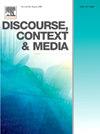Big sister, dog, and ethnic names: Semiotic ideologies of self-naming on Xiaohongshu (RED)
IF 3.1
2区 文学
Q1 COMMUNICATION
引用次数: 0
Abstract
This paper examines the self-naming practices of international students on the Chinese social media platform Xiaohongshu (‘Little Red Book’), focusing on how these practices are shaped by specific semiotic ideologies. Self-naming serves a critical role in understanding the identity processes of international students as they navigate the complexities of cultural differences, social differentiation, and performative demonstrations of ‘doctorateness’ with a domestic audience during their sojourn abroad. Data draw from a cross-disciplinary sample of twenty Chinese doctoral students in the UK, collected through the following qualitative procedures: i) in-depth narrative interviews exploring biographies and histories of engagement with the platform; ii) analysis of posts and messages; and iii) follow-up ‘dialogic-action’ interviews in which participants actively engaged with the platform during discussions. The multiform data was analysed using Mediated Discourse Analysis, focusing on how language, symbols, and self-naming practices are mediated through cross- and intra-cultural contexts, and broader semiotic ideologies of self-naming. The paper discusses three representative examples which collectively underscore themes of showcasing or concealing aspects of identity: ‘big sister’ (姐姐), ‘dog’ (狗), and forms of ‘ethnic names’. Each practice reflects a distinct semiotic ideology, revealing how personal branding intersects with platform affordances and construction of personae to establish individual self-brands as doctoral students abroad. The research highlights the nuanced ways in which international students curate their identities on digital platforms like Xiaohongshu and the importance of critical analyses of language at various substrata of practice.
大姐、狗、民族名:小红书自命名的符号学意识
本文研究了国际学生在中国社交媒体平台小红书(“小红书”)上的自我命名行为,重点关注这些行为是如何被特定的符号学意识形态塑造的。自我命名在理解国际学生的身份过程中起着至关重要的作用,因为他们在国外居住期间要应对文化差异、社会差异的复杂性,并在国内观众面前表现出“博士性”。数据来自20名在英中国博士生的跨学科样本,通过以下定性程序收集:i)深入的叙事访谈,探索与该平台接触的传记和历史;Ii)对帖子和消息的分析;iii)后续“对话-行动”访谈,参与者在讨论期间积极参与平台。使用中介话语分析对多种形式的数据进行了分析,重点关注语言、符号和自我命名实践如何通过跨文化和文化内背景以及更广泛的自我命名的符号学意识形态进行中介。本文讨论了三个有代表性的例子,它们共同强调了展示或隐藏身份方面的主题:“大姐”、“狗”和“民族名称”的形式。每一次实践都反映了一种独特的符号学意识形态,揭示了个人品牌是如何与平台的提供和人物的建构相交叉的,以建立个人在国外的自我品牌。这项研究强调了国际学生在小红书等数字平台上管理自己身份的微妙方式,以及在各种实践基础上对语言进行批判性分析的重要性。
本文章由计算机程序翻译,如有差异,请以英文原文为准。
求助全文
约1分钟内获得全文
求助全文

 求助内容:
求助内容: 应助结果提醒方式:
应助结果提醒方式:


